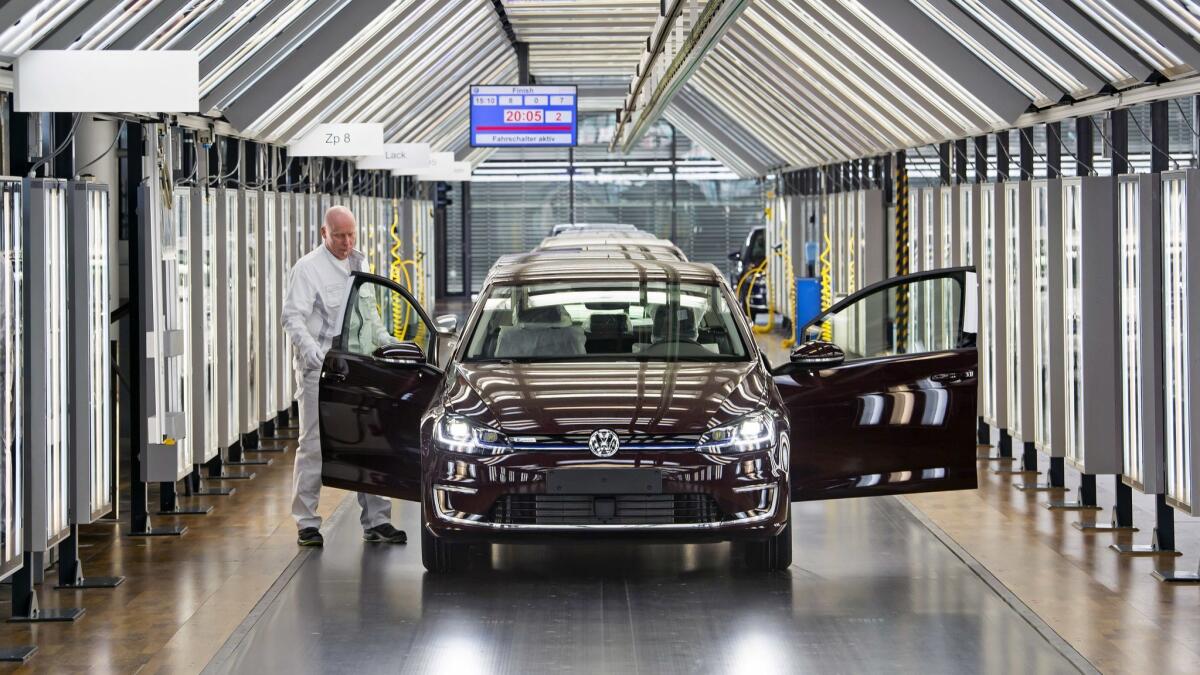Volkswagen pours $25 billion into electric-car batteries, challenging Tesla

- Share via
Volkswagen AG secured $25 billion in battery supplies to underpin an aggressive push into electric cars in the coming years, putting pressure on Tesla Inc. as it struggles with production issues for the mainstream Model 3.
The world’s largest carmaker will equip 16 factories to produce electric vehicles by the end of 2022, compared with three currently, Volkswagen said Tuesday in Berlin. The German automaker’s plans to build as many as 3 million of the cars a year by 2025 is backstopped by deals with suppliers including Samsung SDI Co., LG Chem Ltd. and Contemporary Amperex Technology Ltd. for batteries in Europe and China.
With the powerpack deliveries secured for its two biggest markets, a deal for North America will follow shortly, Volkswagen said. In total, Volkswagen has said it plans to purchase about $60 billion in batteries as part of its electric-car push, which includes three new models in 2018 with dozens more following.
Volkswagen’s battery plans compare to Tesla’s $17.5 billion worth of purchase obligations, primarily related to buying lithium-ion cells from Panasonic, according to a recent filing. Volkswagen called its battery tender one of the biggest purchasing initiatives in the auto industry.
Electric vehicles’ future relies on cobalt. It’s often mined by children and is soaring in price »
As of next year, the 12-brand group will roll out a new battery-powered model “virtually every month,” Chief Executive Matthias Mueller said at Volkswagen’s annual press conference. “This is how we intend to offer the largest fleet of electric vehicles in the world.”
Tesla’s Model 3 sedan is the linchpin of CEO Elon Musk’s plan to bring electric vehicles to the masses, but ramping up production has taken longer and been more challenging than originally anticipated. The Palo Alto, Calif., automaker is now targeting a weekly Model 3 production rate of 2,500 by the end of this month and 5,000 by the end of June.
Diesel quandary
Pressure has intensified on Volkswagen to overhaul its lineup. Its diesel-cheating scandal, which erupted in September 2015, sparked a backlash over the technology, including potential urban driving bans. Diesel is key to efforts to meet tighter environmental targets because of its fuel efficiency, even though it emits smog-causing nitrogen oxides.
The German automaker reaffirmed its backing for the technology, with Mueller calling it “part of the solution,” even as Toyota Motor Corp. pulls diesel cars from its lineup in Europe, the main market for the vehicles.
Volkswagen shares slipped 0.6% to 158.64 euros as of 2:39 p.m. in Frankfurt, reversing a gain earlier in the day and extending the stock’s drop this year to 5.3%.
As part of Volkswagen’s $25-billion push into electric cars, it’s setting up a standalone sub-brand for battery-powered vehicles. The first model with the I.D. nameplate will be the Neo hatchback that goes on sale in 2020. The Audi luxury marque is set to begin deliveries this year of the all-electric E-Tron SUV.
Even with the battery-purchase deals, Volkswagen’s power-supply issues are still far from over. The company has struggled to secure sources of cobalt, a crucial component for modern batteries; it said that it’s working on ways to reduce the amount of the element needed for its electric cars, suggesting ongoing concerns even after setting up supplies for its initial electric-car rollout.
Manufacturing the powerpacks themselves is not in the cards. “This is not one of our core competencies,” said Mueller, who has faced pressure from employee representatives to invest in battery-cell production. “Others can do it better than we can.”
Chinese producer CATL, which Mueller confirmed Tuesday as one of Volkswagen’s future battery providers, is considering a site in Europe for its first overseas plant, Chairman Zeng Yuqun said a week ago.
Development spending
Even with its push to ramp up electric-car production and avoid penalties from tighter environmental regulations, Volkswagen plans to rein in expenditures. Development spending declined 3.9% to about $16 billion in 2017, equivalent to 6.7% of sales. The company reiterated a target to lower that to 6% by 2020.
Managing the technology shift requires an intense focus on maintaining profitability from Volkswagen’s current lineup. The manufacturer predicts an operating margin this year of between 6.5% and 7.5% of revenue, compared with 7.4% in 2017.
“Naturally, we are looking to continue our operating business success in 2018,” said Mueller. “Not least because we must generate the revenue we will need for our enormous future investments.”
More to Read
Inside the business of entertainment
The Wide Shot brings you news, analysis and insights on everything from streaming wars to production — and what it all means for the future.
You may occasionally receive promotional content from the Los Angeles Times.










